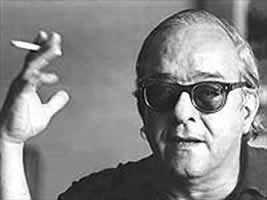
A Volta do Filho Pródigo
(Tentative translation, corrections and suggestions welcome).
I will waken the birds who, for fear of darkness,
Have gone silent in the nighttime branches
And sleeplessly await the break of dawn.
I will rouse the drunkards in the doorways,
The sleepwalking dogs, and the ambient mysteries
Which fill the night. Shouting, I will beseech
The winds to violate and the sea to lay waste
The white beaches thick with prudery.
With laughter and song I will torch
God’s habitual nighttime silence,
So intimidating to man. May the city
Put a lunar shawl over its face
And come out to receive its poet
With jasmine branches and memories.
This hour is for beauty. In every stone,
In every house, in every street, in every
Tree there still lives a kiss made
For me: me, the urban lover, more than
Urban, superhuman, in the wild nighttime city.
Probably I won’t come mounted
On any horse, nor in armor, since this — Poetry —
Will protect me best of all, with its chain mail
Of silence. Very possibly I’ll arrive drunk,
And if it’s January, wearing a sports coat.
What’s important is the arrival, the unity
Of me and the city, the city and me —
And to hear once more the sea shattering
On rocks, or roaring in the ocean,
Lonely like a god…. Beloved Rio,
Woman petrified into buttocks and breasts
And knees of millennial stone, with green
Pubis and armpits and unbound hair,
Fresh and scented with chlorophyll —
I love you, woman, sleeping
By the sea! I love you in your utter nakedness
In the sun, and your peacefulness in the moonlight.
I feel you next to me — your light
Does not harm my silence, my silence
Is yours. I know that, protected
By the beings moving within your arms
Your eyes have visions of other spaces
Past and future. Just as at times
Above the moonlit Niemeyer street,
Amidst the clamor of the whipped waves
The mountains will ponder. What silence
Can be heard settling there, what solemnity
Of nature! I know, and it’s the truth,
That under the Sun, Rio is completely bright,
All too bright, and without mystery.
I know that in the glare of January
Secrets die the way birds die, gladly.
I know all of this.
Now I see with these my tireless eyes
Ideas exploding like flowers
In the rays of the sun, now I see
Mathematical castles collapsing like cards,
Philosophical systems losing their daytime logic
At night, unfinished works of art getting lost
In fron of a sweaty armpit, in the noise of creation,
And crowds of saints made rabid by
The healthful properties of ultraviolet light.
Whoever has the nighttime habit,
Whoever lives in intimacy with silence,
Whoever is able to hear the music of darkness
When life reproduces itself there —
For them, the city offers itself
As a common zone of eternity
In counterpoint to the movement of the sea
And the millennial metamorphoses of the rock,
In its infinity of infinities….
For them, Dos Irmãos tells an astonishing
Story, a story of forces erupting
From the earth, producing sudden forms:
Viúva! Pão de Açúcar! Corcovado!
Further south is the tomb of the Sun —
The huge mesa, where can be seen
At sunset, should you be able to see,
The silhouette of primitive man
(The same who, even today, transformed,
Crosses the mosaic of the Avenue)
And even, who knows?, fan clubs of Nature
In their rows of seats, watching
Sea serpents in blind struggle
Rouse tidal waves with their duel
In the natural stadium of Guanabara….
(more…)


